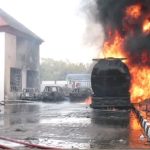Soil Values, in collaboration with the Centre for Dryland Agriculture (CDA) of Bayero University Kano, organized on the weekend of November 16, 2025, a Field Day on Integrated Soil Fertility Management in Kano and Jigawa, aimed at helping smallholder farmers restore soil fertility and improve cowpea production.
In the dry area of Takai, in Kano State, where declining soil fertility has gradually eroded farmers’ confidence, new hope is beginning to emerge.
The trial was conducted on the farm of Ahmad Isa Falali, where four demonstration plots were set up side by side, each representing the use of inorganic fertilizers, the farmer’s traditional practices, the use of organic fertilizers, and the ISFM (Integrated Soil Fertility Management) approach. This comparative trial not only provided technical training but also allowed farmers to see firsthand what soil restoration looks like.
“This training has changed the way I produce cowpea. Learning how to make compost, recycle residues, and adjust nutrient levels has turned the ISFM plot into an ‘open-air classroom’ for me,” said Ahmad.
Representing the CDA Director of Research, Dr Mustapha Mohammed Bello, Deputy Director, Research and Innovation, CDA described the Field Day as one of the activities of the Soil Values project, funded by the Government of the Netherlands for a period of ten years. The project aims to improve land use in Kano, Jigawa, and Bauchi states through beneficiary training.

One of the most striking interventions came from a woman farmer, Rayya Ibrahim Abdullahi, who stated that the training sessions had given her “the confidence needed to properly manage the soil.” She also wishes to pass this knowledge on to the women in her group, illustrating the growing importance of women’s involvement in soil management.
In Falali, the message was clear: soil health is not a mystery, but a skill that farmers can reclaim.
It was recalled that the training is part of a ten-year initiative funded by the Kingdom of the Netherlands through its Directorate-General for International Cooperation (DGIS).
Arogunyo explained that the program is implemented by three main partners: the International Fertilizer Development Center (IFDC), SNV Netherlands Development Organisation, and Wageningen University & Research (WUR).
The program also includes five scientific partners: the International Institute of Tropical Agriculture (IITA), AGRA, ICRAF, ISRIC, and the International Water Management Institute (IWMI).
“The essence of the program is to reduce the yield gap, improve soil fertility, and encourage farmers to give back to the soil in order to ensure long-term productivity and food security,” he concluded.
About the Soil Values Program
The Soil Values program operates in a context marked by climatic and socioeconomic challenges faced by Sahelian countries, such as recurrent droughts, sociopolitical conflicts, desertification, and the effects of climate change.
The initiative is built around three areas of intervention (Agroecology, Inclusive Markets, and Enabling Environment), as well as five domains of action (Clustering, Integration, Linking, Dialogue, and Analysis & Learning).
The Soil Values program aims to improve the fertility and productivity of two million hectares of agricultural land in the Sahel—specifically in Burkina Faso, Mali, Niger, and northern Nigeria—while strengthening the resilience and well-being of 1.5 million farmers, with a particular focus on women and youth.
With a budget of 100 million euros, the program aims to restore degraded lands across the Sahel—including Nigeria, Burkina Faso, Mali, and Niger—and to reach 1.5 million smallholder farmers.
The goal is to restore two million hectares of degraded land in the Sahel. In Nigeria, 800,000 hectares are expected to be restored, directly benefiting 600,000 small producers.






